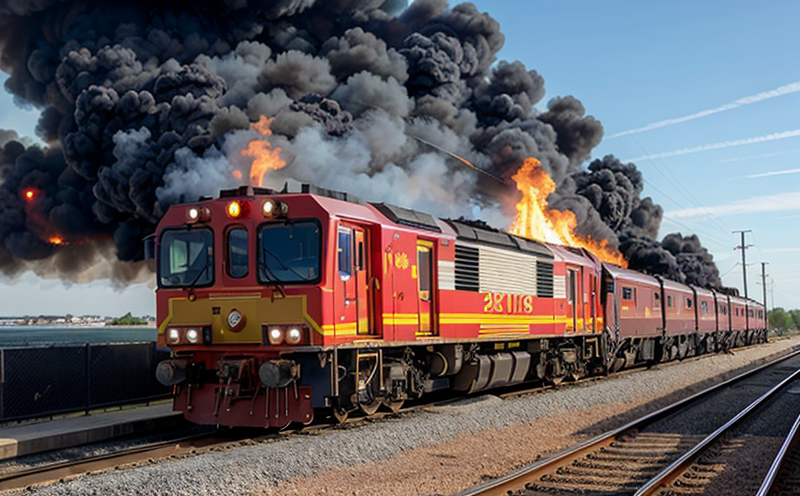Post-Fire Analysis of Marine Cabin Components
The post-fire analysis of marine cabin components is a critical service that ensures safety and compliance in the maritime sector. This process involves detailed examination, testing, and evaluation of materials used within enclosed spaces aboard ships to identify any potential weaknesses or vulnerabilities after exposure to fire.
Marine cabins are often made from a variety of combustible materials such as wood, fiberglass, and synthetic fabrics. These components can undergo significant thermal degradation during a fire event. Post-fire analysis helps determine the extent of damage and assesses the effectiveness of fire protection measures installed on board vessels. It also provides valuable insights into material performance under real-world conditions.
During post-fire analysis, samples are collected from various parts of the cabin, including walls, ceilings, floors, furniture, and fittings. These samples undergo rigorous testing in our accredited laboratories to evaluate their physical properties like strength, flexibility, and chemical composition before and after exposure to high temperatures. The results help shipowners make informed decisions about maintenance schedules, replacement policies, and future design improvements.
Our team of experts uses advanced analytical techniques including thermal gravimetric analysis (TGA), differential scanning calorimetry (DSC), and Fourier transform infrared spectroscopy (FTIR) to provide comprehensive data. This information supports compliance with relevant international standards such as ISO 1716:2008, which specifies methods for determining the ignition temperature of textiles used in furnishing.
In summary, post-fire analysis plays a crucial role in maintaining safety standards on board ships by identifying issues early and preventing further incidents. It ensures that all materials meet strict quality control requirements set forth by regulatory bodies worldwide.
| Material | Type of Damage Observed |
|---|---|
| Fiberglass Panels | Cracking, delamination |
| Plywood Walls | Buckling, charring |
| Synthetic Upholstery | Char marks, melting |
| Type of Test | Description |
|---|---|
| TGA | Determines the weight loss profile during heating. |
| DSC | Measures heat flow changes as a function of temperature. |
| FTIR | Analyzes molecular structure by measuring infrared absorption. |
Why It Matters
The importance of post-fire analysis cannot be overstated, especially in the marine environment where enclosed spaces are common. Fires can occur due to various factors including electrical faults, human error, or spontaneous combustion. When they do happen, the impact on crew safety and vessel integrity is profound.
- Reduces risk of re-ignition
- Promotes safer living conditions for passengers and crew
- Aids in meeting stringent regulatory requirements
- Provides data for continuous improvement in product design and manufacturing processes
By conducting thorough post-fire analyses, we contribute significantly to enhancing the overall safety profile of marine vessels. This not only protects lives but also helps maintain operational efficiency by minimizing downtime associated with potential hazards.
Industry Applications
This service finds application across multiple sectors within the maritime industry:
- Cruise ships: To ensure passenger safety and enhance onboard experience.
- Ocean liners: For maintaining reliability during long voyages.
| Industry Segment | Key Considerations |
|---|---|
| Cruise Ships | Safety, comfort, regulatory compliance |
| Ocean Liners | Reliability, crew safety |
| Cargo Vessels | Protection of cargo, reduction in insurance premiums |
Each segment has unique challenges and requirements when it comes to fire safety. Our post-fire analysis service caters specifically to these needs ensuring that each vessel meets the highest standards of safety and compliance.
Why Choose This Test
Selecting the right post-fire analysis partner is essential for achieving reliable results that can be trusted for decision-making purposes. Here are several reasons why choosing our service is beneficial:
- Accreditation: Our laboratory is fully accredited to perform these tests according to international standards.
- Expertise: We employ highly skilled professionals who possess extensive knowledge in materials science and fire safety engineering.
- Rigorous Methods: We use state-of-the-art equipment and methodologies ensuring accurate and reproducible results.
- Comprehensive Reporting: Our reports are detailed, concise, and easy to understand providing actionable recommendations for improvement.
In addition to these advantages, we offer flexible turnaround times tailored to your schedule. This allows you to quickly address any issues identified through our testing services without disrupting your operations.





